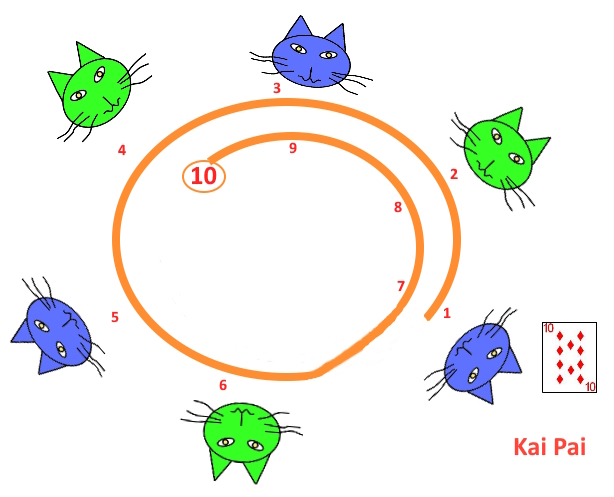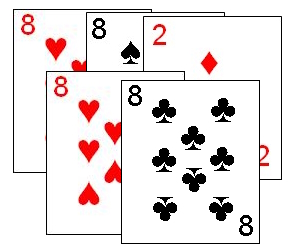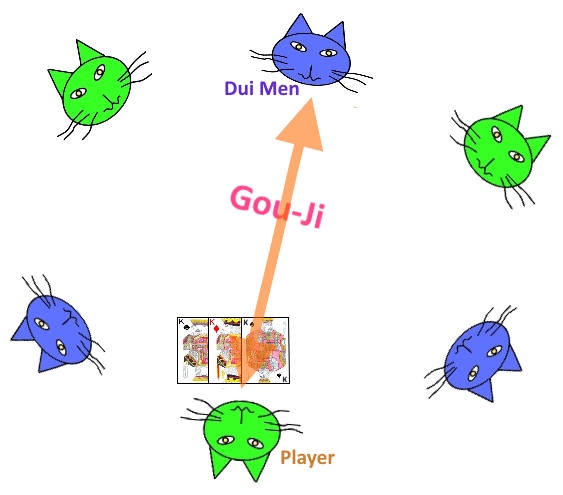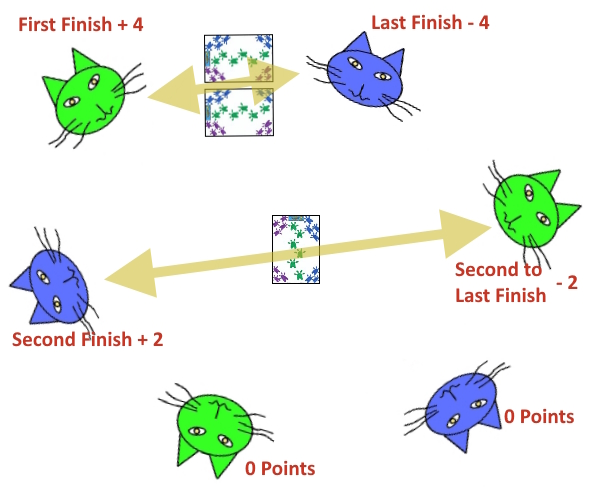Determination of partnerships can be performed using a variety of methods, with a draw of cards commonly used. Using this method, each player would thus draw one card from the shuffled deck with the three players drawing the three highest cards playing as partners opposing the players drawing the three lowest. The players should be seated at the table in such a manner that the players at each side are both members of the opposing team.
 Determining which player will begin drawing cards first and have the
first player is slightly more complicated. For the first hand of the
game, one player is randomly selected as the Kai Pai (which can be the
player drawing the highest card during the draw for determining
partnerships). To start, this player draws a card from the top of the
shuffled deck. He then begins making a count around the table based on
the rank of the card drawn. He starts with himself (with "one") and begins
a count around the table in a counter-clockwise direction, until he
reaches the rank of the card drawn. For this purpose, Aces count as one,
the numbered cards 2-10 have a value of the number found on the face of the card, Jacks have a count value of 11, Queens 12, and Kings 13. The player at which this count stops will thus be the first player to start the draw. After this count, the card drawn is added back into the center of the deck. If the drawn card is any Joker it is added back to the center of the deck, and the role of Kai Pai moves to the next player at the current Kai Pai player's right, who then follows the same procedure. The player at which the count stops, has the right to draw the first card.
Determining which player will begin drawing cards first and have the
first player is slightly more complicated. For the first hand of the
game, one player is randomly selected as the Kai Pai (which can be the
player drawing the highest card during the draw for determining
partnerships). To start, this player draws a card from the top of the
shuffled deck. He then begins making a count around the table based on
the rank of the card drawn. He starts with himself (with "one") and begins
a count around the table in a counter-clockwise direction, until he
reaches the rank of the card drawn. For this purpose, Aces count as one,
the numbered cards 2-10 have a value of the number found on the face of the card, Jacks have a count value of 11, Queens 12, and Kings 13. The player at which this count stops will thus be the first player to start the draw. After this count, the card drawn is added back into the center of the deck. If the drawn card is any Joker it is added back to the center of the deck, and the role of Kai Pai moves to the next player at the current Kai Pai player's right, who then follows the same procedure. The player at which the count stops, has the right to draw the first card.
If the game is a new game, but not the first full game of a new session, this same procedure is used, however, the role of Kai Pai would be the player to the immediate right of the Kai Pai from the last game.
If a game is currently still in progress, the player having the "Big Loser" role from the last hand, has the privilege of declaring any player (including themselves) as the player who will draw the first card in this hand. This player will normally also have the privilege of having the first play once play of the hand begins.
As in most games from China, there is no actual deal, but rather players draw the cards forming their hand from the deck which is placed in the center of the table. The deck is usually spread partially out to make drawing more efficient and prevent the deck from toppling over. Starting with the player set to draw the first card, the players begin drawing cards from the deck, in a counter-clockwise direction around the table. This continues until each player has a hand consisting of 36 total cards (which would also exhaust the entire deck).
On the first hand of a game, if any player finds in his hand two cards in the denomination of three and of the same suit in their hand, has the privilege to announce this and make the first player in the hand. If two or more players find such cards, the first player to announce this fact is set as the first player. Thus, a player can announce this as soon as he draws the second such three into his hand while drawing. If, during the first game, no player finds two threes of the same suit in his hand (or no player elects to announce this), the player who drew the first card in that hand has the privilege of having the first play of the hand. During a game in progress, the player currently in the role of "Big Loser" from the last hand, has the privilege of having the first turn.
If, after all cards have been drawn, any player finds that he has a hand containing no Jokers or cards of denomination two in his hand, he may declare a "Revolution". His teammates, or even his opponents, may try to persuade him to continue play with the existing cards as dealt, however, this player has the last word, and if he elects, he may so declare the "Revolution". In this event, all the cards are thrown in, shuffled together and a completely new deal started.
If no player declares a "Revolution", play of the hand can begin. The player to start the draw is also player to have the first turn, with the turn then rotating in a counter-clockwise direction around the table.
 This first play consists of this individual playing one or more cards to the table. If multiple cards are played by a player on his turn, all these cards must be of the same denomination (suit being irrelevent). Twos and Jokers are considered wild cards and thus can be used to substitute for any other card and thus can be
included as part of any legal play. After his play, the next player in rotation then has
a turn. In order to be a legal play, this next player must play a higher combination than that played by the previous player. In order to considered a higher combination, the player must play an equal number of cards, but in a higher denomination (for example three eights would be a higher combination than three fives). If the combination includes any twos, these are simply considered a replacement for the natural card it was intended to represent in the played combination. Jokers can also be set as a substitution for any other card, however if a combination contains one or more black Jokers, it can only be beaten by a combination of higher ranked natural cards AND containing the same number of red Jokers as the previous combination contained black Jokers. Combinations containing one or more Red Jokers cannot be beaten by any play. However, a combination containing natural cards and Jokers can only be played if the set of natural cards in the combination played is higher than the current high play on the table.
This first play consists of this individual playing one or more cards to the table. If multiple cards are played by a player on his turn, all these cards must be of the same denomination (suit being irrelevent). Twos and Jokers are considered wild cards and thus can be used to substitute for any other card and thus can be
included as part of any legal play. After his play, the next player in rotation then has
a turn. In order to be a legal play, this next player must play a higher combination than that played by the previous player. In order to considered a higher combination, the player must play an equal number of cards, but in a higher denomination (for example three eights would be a higher combination than three fives). If the combination includes any twos, these are simply considered a replacement for the natural card it was intended to represent in the played combination. Jokers can also be set as a substitution for any other card, however if a combination contains one or more black Jokers, it can only be beaten by a combination of higher ranked natural cards AND containing the same number of red Jokers as the previous combination contained black Jokers. Combinations containing one or more Red Jokers cannot be beaten by any play. However, a combination containing natural cards and Jokers can only be played if the set of natural cards in the combination played is higher than the current high play on the table.
It is also possible to play a combination consisting solely of wild cards. A set of all twos beats any combination of the same number of cards that contains only natural cards (regardless of the denomination of the cards) or some natural cards and some twos. A set consisting of all twos can only be beaten by a set, consisting of the same number of cards, which consists of all Jokers. If a set entirely consisting of wild cards contains at least one black Joker, to be beaten, a set of the same number of cards, containing all Jokers and at least the same number of red Jokers as per the previous play. A set containing red Jokers cannot be beaten by any other play. If a player is unable or unwilling to beat the combination he must declare "Pass" and the turn continues around the table to the next player. Once a player passes, he cannot elect to play again until a new combination is started (the cards are cleared from the table). This continues until all but one player has passed. Once this occurs, the player who played the highest combination which was not beaten by any other player removes all the played cards from the table setting them aside out of play (clearing the cards), and starts a new set of plays using any legal combination from cards remaining in his hand.
Certain special combinations trigger a special event called Gou Ji. This is a standoff amongst two players. In order to trigger such an event a player must play a special high ranking combination. This combination can be any of the following:
- Any combination including one or more Jokers
- Any wild card or set consisting solely of wild cards
- A combination of two or more Aces
- A combination consisting of two or more Kings
- A combination of three or more Queens
- A combination consisting of four or more Jacks
- A combination consisting of five or more tens
 Once such a combination is played, by any player on his turn, this immediately starts a Gou Ji. This then starts head to head play of this player against the opponent who is directly across the table from him (called his Dui Men).
A player may participate as the Dui Men in a Gou Ji even if he has
already passed during the current round. The Dui Men must then attempt to beat this play (if able and willing). If he does so play such a combination, the player who played the combination must then attempt to beat the combination played by the Dui Men, continuing back and forth amongst these two players until one of the players passes. Whichever player manages to win this head to head play (the other player passing) clears the cards and then begins a new series, playing any legal combination from his hand, and the turn continues as normal, in a counter-clockwise direction from that player.
Once such a combination is played, by any player on his turn, this immediately starts a Gou Ji. This then starts head to head play of this player against the opponent who is directly across the table from him (called his Dui Men).
A player may participate as the Dui Men in a Gou Ji even if he has
already passed during the current round. The Dui Men must then attempt to beat this play (if able and willing). If he does so play such a combination, the player who played the combination must then attempt to beat the combination played by the Dui Men, continuing back and forth amongst these two players until one of the players passes. Whichever player manages to win this head to head play (the other player passing) clears the cards and then begins a new series, playing any legal combination from his hand, and the turn continues as normal, in a counter-clockwise direction from that player.
If, however, once a Gou Ji is triggered, any of the opponents of the player thus playing the combination that triggered the Gou Ji has in hand exactly two valid and legal combinations, one of which could beat the current play, may announce "Shao Pai". This player would then play head-to-head against the player who played the original combination. After announcing "Shao Pei", the player would then play his higher combination to the table, followed immediately by his second combination, depleting his hand, and thus dropping out of the hand (becoming a winner of that hand). However, if another player can beat the combination played, that player then begins a Gou Ji against the player directly across the table from himself. The player announcing the "Shao Pai" thus must wait for further opportunities, during normal gameplay to play his remaining cards or combination. A player may also, in the correct circumstances, announce a "Shao Pai" if he has one combination that is high enough to beat the combination triggering the Gou Ji, one or more combinations which contain at least one Joker, and finally one combination of any type. In this case, after beating the Gou Ji play, this player would then play each of his combinations to the table, in sequence. If none of these combinations are beaten by any other player, that player then exits that hand, as one of the winners. However, as soon as any of the combinations is beaten (except the last combination played which would the basic combination that contained no Jokers), the players turn immediately ends, resuming with the player immediately to the right of the player beating the combination and continuing in the normal counter-clockwise rotation around the table.
Another special circumstance in this game is that of a Rang Pai. If, after a player has played, the next two players in turn pass, the player directly across the table from the player is able to beat the play, a player may request that his left hand teammate intentionally pass on his next turn (called Rang Pai). This player is not obligated to pass, but often will at the request of one of his teammates. If the next player in turn, then, also passes, this results in a head to head play of the player and his Dui Men (essentially resulting in a Gou Ji).
Once a player manages to play his last combination of cards to the table (allowing him to deplete the cards from his hand), play continues with the other players, with the following players attempting to beat that combination as in normal play. If no other player is able or willing to beat that play, the player to the immediate right of the player who depleted his hand is entitled to start the next combination (called "catching the wind"). The player who has run out of cards takes no further play in the hand, with the remaining players continuing play until only one player at the table remains with cards in hand (this player is called the "Big Loser"). If a players Dui Men has dropped out of play, a player may, of course not start a Gou Ji play, and the play simply continues as normal around the table for that combination.
Once two players have dropped from the game, the normal ordering of turns no longer occurs. In this event, if two or three players on the same team are set to play consecutively, these player may agree to play in any order, to assist in some players being able to get rid of more cards quickly. If, with four remaining players, each player has an opponent on each side, the players in each partnership may agree, amongst themselves what order they will play in, but play must still alternate amongst the two partnerships, and each player must get an opportunity to play before any other player has multiple turns.
 Once all but one player has cards remaining, the hand ends are points are distributed based on the order on which the players were able to drop from the hand. The first player to have managed to deplete his hand (called the Main Winner) earns four points for his team,
added to their current score. The second such player to manage to deplete his hand earns
two such points for his team. The players finishing third and fourth in
the hand earn zero points. The player finishing last must subtract four points from his teams ongoing score and the player finishing second to last must subtract two
such points. If one team manages to finish first, second and third, all scores (both positive and negative) for that hand are doubled. Each team keeps a cumulative score over the course of multiple hands.
Once all but one player has cards remaining, the hand ends are points are distributed based on the order on which the players were able to drop from the hand. The first player to have managed to deplete his hand (called the Main Winner) earns four points for his team,
added to their current score. The second such player to manage to deplete his hand earns
two such points for his team. The players finishing third and fourth in
the hand earn zero points. The player finishing last must subtract four points from his teams ongoing score and the player finishing second to last must subtract two
such points. If one team manages to finish first, second and third, all scores (both positive and negative) for that hand are doubled. Each team keeps a cumulative score over the course of multiple hands.
In addition to scores earned based on finishing position during the hand, the two winning players also have the advantage of requiring the losing players to give high cards to these winning players after the cards are dealt for the next hand (this is called tribute). Thus, the player finishing last must give his two highest cards to the player finishing first, who then gives any two cards of his choice back to that payer. The exchanged cards should be passed face-down such that no other player can see the faces of these cards. Similarly, the player finishing second to last must give his highest card from his hand to the player finishing second on the last game, and the player receiving the card passes any card of his choice from his hand back to that player. These cards are also passed face-down. If any of these exchanges were to occur amongst two players on the same team, those players may agree not to make any exchange of such cards providing both players agree to this. If the last player and second to last player are on the same team, these players may opt to switch places as far as the exchanging of cards (i.e. the second to last player gives the main winner two cards, and the last player gives one card to the second finisher). If the first, second, and third players to finish during a hand are all on the same team, each member of the opposing team must give their highest card to the player opposite in exchange for any card of that player's choice. If any player has in hand all four red Jokers, this player is immune to giving tribute to any other player (called Liberation) and may thus refuse a request for his highest card or cards.
Once a set number of hands have been completed, the team with the highest accumulated positive score is declared the winner.